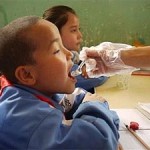
Those of us who believe in the unvarying beneficence of Mother Nature have yet to contemplate Neisseria meningitidis. N. meningitidis is a bacterium that can live harmlessly in the throats of healthy people. But about 500 times a year in the US it causes bacterial meningitis, a life-threatening infection in which the membranes lining the brain and spinal cord become inflamed. Bacterial meningitis is treatable with antibiotics but even with treatment patients sometime suffer hearing loss or brain damage. And despite prompt treatment infection is sometimes fatal. When N. meningitidis gets into the blood stream it can cause loss of circulation to the extremities and loss of limbs.
On the first day of medical school I met a classmate who would become a dear friend. She was walking with a cane. During her summer vacation she had lost a couple of toes due to a blood stream infection with N. meningitidis. It would only be later when we studied microbiology that we understood how close to death she came.
N. meningitidis is transmitted between people living in very close quarters. Outbreaks can occur in facilities like prisons, military barracks, and college dormitories. For that reason, most college students are vaccinated against most strains of N. meningitidis prior to attending.
This year two US campuses have had outbreaks of meningitis due to N. meningitidis. Princeton has had seven cases. The first was in March and the most recent in late November. And in the last month four students developed meningitis at University of California, Santa Barbara (UCSB). One of the UCSB students suffered a blood stream infection and had both of his feet amputated.
The two campus outbreaks appear to be unrelated, but both are caused by a strain of N. meningitidis that is not covered by the US vaccine. Health officials have been working to obtain doses of the European vaccine for students in both campuses. Meanwhile hundreds of students who have come into contact with the sickened patients are receiving preventive antibiotics, and crowded gatherings like fraternity parties have been canceled. This is especially sad since it’s my understanding that fraternity parties are the only reason people attend UCSB.
I’m sure the students and parents of both campuses are quite anxious. I hope that both outbreaks are extinguished promptly and that no one else falls ill. And to the student who lost both feet I wish determination and strength and high-tech prosthetics to make the most of what I hope will now be a healthy and long life.
While the public health officials continue their difficult work we are left to retreat to our delusions that nature is benevolent. So we will shop for our organic free-range arugula and our locally-sourced fair-trade hemp sweater vests. And we will do our best to forget that left to her own devices Mother Nature is usually trying to kill us.
Learn more:
Second Meningitis Outbreak Erupts In Southern California (Shots, NPR’s health blog)
Two universities battle meningitis outbreaks (USA Today)
Meningitis outbreak: UC Santa Barbara lacrosse player’s feet amputated (Los Angeles Times)
Why College Campuses Get Hit By Meningitis Outbreaks (Shots, NPR’s health blog)
Bacterial Meningitis (Centers for Disease Control and Prevention)

